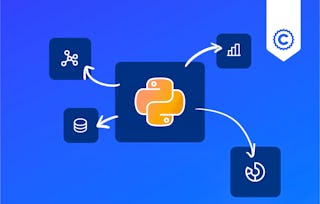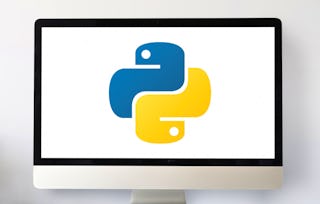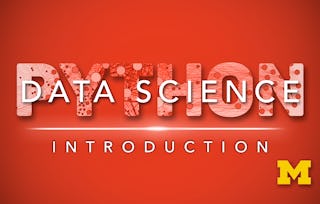Master Python for data science with hands‑on projects. Learn pandas, statistics, and visualization to solve real‑world business problems. Build job‑ready skills in data wrangling, exploratory data analysis (EDA), and charting with matplotlib/seaborn—no prior experience required. This beginner‑friendly course guides you through cleaning messy data, applying descriptive and inferential statistics, and preparing datasets for machine learning. You’ll design analyses that answer business questions, communicate insights with compelling visuals, and complete challenging assessments aligned to workplace scenarios.

Python for Data Science

Python for Data Science
This course is part of Fractal Data Science Professional Certificate

Instructor: Fractal Analytics Academy
7,343 already enrolled
Included with
99 reviews
Recommended experience
What you'll learn
Build pandas pipelines to clean, transform, and aggregate real‑world datasets.
Perform EDA and compute descriptive statistics to summarize data quality and behavior.
Apply hypothesis tests (t‑test/chi‑square) and interpret results for business decisions.
Create publication‑quality charts (bar/line/box/heatmaps) with matplotlib & seaborn.
Skills you'll gain
- Data Science
- Data Cleansing
- Matplotlib
- Data Transformation
- Feature Engineering
- Data Analysis
- Descriptive Statistics
- Seaborn
- Correlation Analysis
- Data Manipulation
- Statistical Hypothesis Testing
- Statistics
- Jupyter
- Data Wrangling
- Data Preprocessing
- Pandas (Python Package)
- Exploratory Data Analysis
- Statistical Analysis
- Data Visualization Software
- Business Analytics
Details to know

Add to your LinkedIn profile
17 assignments
See how employees at top companies are mastering in-demand skills

Build your Data Analysis expertise
- Learn new concepts from industry experts
- Gain a foundational understanding of a subject or tool
- Develop job-relevant skills with hands-on projects
- Earn a shareable career certificate from Fractal Analytics

There are 5 modules in this course
In the first module of the Python for Data Science course, learners will be introduced to the fundamental concepts of Python programming. The module begins with the basics of Python, covering essential topics like introduction to Python.Next, the module delves into working with Jupyter notebooks, a popular interactive environment for data analysis and visualization. Learners will learn how to set up Jupyter notebooks, create, run, and manage code cells, and integrate text and visualizations using Markdown. Additionally, the module will showcase real-life applications of Python in solving data-related problems. Learners will explore various data science projects and case studies where Python plays a crucial role, such as data cleaning, data manipulation, statistical analysis, and machine learning.By the end of this module, learners will have a good understanding of Python, be proficient in using Jupyter notebooks for data analysis, and comprehend how Python is used to address real-world data science challenges.
What's included
12 videos6 readings2 assignments
By the end of this module, learners will acquire essential skills in working with various types of data. They will have a solid grasp of Python programming fundamentals, including data structures and libraries. They will be proficient in loading, cleaning, and transforming data, and will possess the ability to perform exploratory data analysis, employing data visualization techniques. They will also gain insights into basic statistical concepts, such as probability, distributions, and hypothesis testing.
What's included
32 videos4 readings6 assignments2 programming assignments5 ungraded labs
By the end of this module, learners will gain a comprehensive understanding of statistical concepts, data exploration techniques, and visualization methods. Learners will develop the skills to identify patterns, outliers, and relationships in data, making informed decisions and formulating hypotheses. Ultimately, they will emerge with the ability to transform raw data into meaningful insights, effectively communicate their findings through data storytelling, and apply EDA across diverse real-world applications.
What's included
34 videos1 reading5 assignments1 programming assignment4 ungraded labs
By the end of this module, learners will acquire the essential skills to effectively transform raw and often messy data into a structured and suitable format for advanced analysis. They will master the techniques for handling missing values, identifying and dealing with outliers, encoding categorical variables, scaling and normalizing numerical features, and handling textual or unstructured data. Learners will also be proficient in detecting and addressing data inconsistencies, such as duplicates and errors. Learners will be able to treat data to make it suitable for further analysis. Upon completion of this module, Upon completion
What's included
25 videos2 readings3 assignments1 programming assignment3 ungraded labs
By the end of this module, learners will develop a profound understanding of how to craft and enhance features to optimize the performance of machine learning models. They will be adept at identifying relevant variables, creating new features through techniques such as one-hot encoding, binning, and polynomial expansion, and extracting valuable information from existing data, like dates or text, using methods like feature extraction and text vectorization. Learners will also grasp the concept of feature scaling and normalization to ensure the consistency and comparability of feature ranges. With these skills, they will possess the ability to shape data effectively, amplifying its predictive power and contributing to the construction of robust, high-performing machine learning pipelines.
What's included
11 videos2 readings1 assignment1 programming assignment1 ungraded lab
Earn a career certificate
Add this credential to your LinkedIn profile, resume, or CV. Share it on social media and in your performance review.
Instructor

Offered by
Explore more from Data Analysis
 Status: Free Trial
Status: Free Trial Status: Free Trial
Status: Free Trial Status: Free Trial
Status: Free TrialUniversity of Michigan
Why people choose Coursera for their career

Felipe M.

Jennifer J.

Larry W.

Chaitanya A.
Learner reviews
- 5 stars
66.66%
- 4 stars
12.12%
- 3 stars
3.03%
- 2 stars
2.02%
- 1 star
16.16%
Showing 3 of 99
Reviewed on Feb 18, 2024
Good course. Need more in-depth details with case studies.
Reviewed on Nov 14, 2023
All expert did a comprehending way of giving their knowledge for learning, a great work.
Reviewed on Dec 4, 2023
Great course - focusses on problem solving and application of python.

Open new doors with Coursera Plus
Unlimited access to 10,000+ world-class courses, hands-on projects, and job-ready certificate programs - all included in your subscription
Advance your career with an online degree
Earn a degree from world-class universities - 100% online
Join over 3,400 global companies that choose Coursera for Business
Upskill your employees to excel in the digital economy
Frequently asked questions
A practical, beginner‑friendly introduction to Python for data science focused on data wrangling, statistics, and visualization—skills employers value and use daily.
Beginners and professionals transitioning into data analysis or business analytics who want hands‑on, job‑ready skills.
Clean and analyze datasets with pandas, run statistical tests, build insightful visualizations, and prepare data for ML—then present findings that drive decisions.
More questions
Financial aid available,


